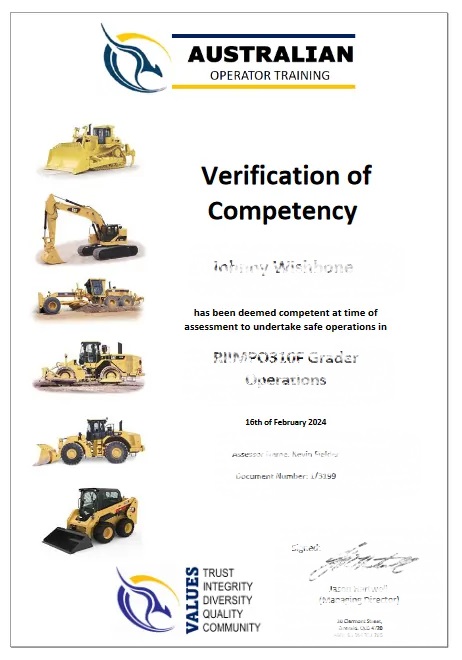COMPETENCY

VERIFICATION OF COMPETENCY – MOBILE PLANT
A number of Office of the Federal Safety Commissioner criteria reference the requirement to ensure that a ‘competent person’ undertakes a particular task or activity, as identified in the OFSC Evidence Guide.
This Information has been developed to provide information regarding the standards and expectations of the Office of the Federal Safety Commissioner specifically in relation to competency requirements for the operation of mobile plant.
The Office of the Federal Safety Commissioner Audit Criterion H16.8 requires a system to be in place to define the competency requirements for the operation of mobile plant, which may be a combination of licences, formal training through an RTO and/or a Verification of Competency (VoC) process. VoC is defined within the OFSC Evidence Guide as ‘a method of documented evaluation of the skill level of a person against defined competency standards in order to evaluate the person’s ability to carry out the relevant activity or works.’
Accredited companies are required to ensure that workers operating mobile plant are competent, and that there is a system in place to ensure operators of mobile plant have met the minimum legislative requirements.


VERIFICATION OF COMPETENCY – MOBILE PLANT
1.1 – What is required:
The following can be used as evidence of competency:
High-Risk Work Licence issued by a State or Territory under the National Certification System as per the legislation; or
- Where a High-Risk Work Licence is not required by legislation:
- Licence or Certificate of Competency issued under previous State or Territory legislation for
which there is no longer a High-Risk Work Licence required e.g. load shifting equipment; or
- Statement of Attainment or Certificate issued by a Registered Training Organisation (RTO) for
the successful completion of the appropriate unit of competency in the Nationally Recognised Training (NRT) package; or
- evidence of formal VoC assessment against defined competency standards, which should:
− be completed, or confirmed as having been completed, by the accredited company to an acceptable level, such as the relevant NRT, internal VoC process, or equivalent.
− include a detailed and documented assessment standard.
− be completed by a person (or persons) who meets the documented competency as defined by the company to conduct a VoC assessment; and
− be evidenced by a signed, completed VoC assessment.
1.2 – What is NOT evidence:
- a letter signed by an employer or supervisor claiming that the worker is competent will not, on its own, be accepted as evidence of competence.
1.3 – What is NOT required:
- a further VoC assessment in addition to evidence of a High Risk Work Licence, RTO issued Certificate of Competency, or other accepted processes in section 1.1; or
- refresher training unless required by the legislation or RTO, or deemed necessary by the company.
The VET system of qualifications and national units of competency ensures that trainees are trained to a benchmark standard against each unit. However, the VET system is only able to guarantee that an operator is competent at the time they were assessed. As we all know, skills and knowledge degrade unless they are constantly being applied.
In the case where workers are not constantly applying their skills in a work context, we recommend re-sitting (refreshing) the course in question. This allows us to fill in knowledge gaps and bring the worker up to date with changes to legislation, technology or best practice. Most sites in Australia will not deem a worker current against a unit of competency if it is older than 24 months.
In the instance where a worker is constantly applying their skills at work, there is a greater likelihood of them retaining the majority of required skills and knowledge against the unit. In this case, we do not need to re-train the worker and can simply challenge test them and perform a Verification of Competency (VOC). Increasingly, employers in Australia are determining that undertaking a VOC process with their workers is a time-efficient and cost-effective method of ensuring that the individual can demonstrate “current competency”.
Not all VOC’s are created equal. Because VOC sits outside the VET system and its regulator ASQA, there is no guarantee that a quality assurance process has been applied to any given VOC process.
Australian Operator Training believe that any VOC must be held to an equal standard to the VET unit of competency. This is why all our VOC programs are mapped back to the unit of competency, and then contextualised to the actual worksite where possible. In cases where sites have a well-developed VOC checklist for a given skillset, we are pleased to assess against this.
HOW DOES IT WORK?
Contact us to discuss your requirements. We will speak with you about the number of workers and skillsets that require verification. We can perform VOC assessments on site, or at any of our professional training facilities in Queensland, New South Wales, Victoria or Western Australia. Workers must provide evidence that they have undertaken formal training and hold the national unit of competency being verified. All our VOC assessors hold the relevant units of competency, vocational experience and are industry experts in their field.
HOW LONG DOES IT TAKE?
This depends on how many workers are involved, but typically our VOC programs are between 2 and 4 hours in duration.
WHAT DOES IT COST?
This depends on the number of workers and the skillsets being verified. Contact us on 1300 504 517 to discuss your requirements and receive a quote.
OUTCOME
Workers successfully demonstrating competency will be provided with an ID Card stating the VOC attained.
Workers who are unable to demonstrate competency will receive written feedback regarding the elements of competency that were lacking, and the nature of the gap training required prior to re-assessment. We often counsel workers who are unable to demonstrate competency to re-sit the VET course in question.
WHAT VOC’s CAN YOU DO?
Australian Operator Training can perform VOC for workers in the following skills:
- All Mobile Plant Tickets
- All High Risk Tickets
- Working at Heights
- Confined Space Entry and Breathing Apparatus
HOW DO I ARRANGE IT?
Contact us on 1300 504 517 to discuss your requirements and receive an obligation-free quote.
These are a current list of the VOC’s we offer
General
RIIWHS204E VOC – Work Safely at Heights
RIIWHS202E VOC – Enter and Work in Confined Spaces
RIIRTM203E VOC – Work as a Safety Observer / Spotter
Truck Licensing
VOC – Truck Licencing
VOC – Light Rigid
VOC – Medium Rigid
VOC – Heavy rigid
VOC – Heavy Combination
VOC – Multi Combination
VOC – Vacuum Truck
Cranes and Rigging
TLILIC0016 VOC – Licence To Operate A Bridge And Gantry Crane
CPCCLHS3001 VOC – Licence To Operate A Personnel And Materials Hoist
TLILIC0020 VOC – Licence To Operate A Slewing Mobile Crane (Over 100 Tonnes)
TLILIC0021 VOC – Licence To Operate A Slewing Mobile Crane (Up To 100 Tonnes)
TLILIC0023 VOC – Licence To Operate A Slewing Mobile Crane (Up To 60 Tonnes)
TLILIC0022VOC – Licence To Operate A Slewing Mobile Crane (Up To 20 Tonnes)
TLILIC0018 VOC – Licence To Operate A Non-Slewing Mobile Crane (Greater Than 3 Tonnes Capacity)
CPCCLTC4002 VOC – Licence To Operate A Self-Erecting Tower Crane
CPCCLTC4001 VOC – Licence To Operate Tower Crane
CPCCLDG3001 VOC – Licence To Perform Dogging
CPCCLRG3001 VOC – Licence To Perform Rigging – Basic
CPCCLRG3002 VOC – Licence To Perform Rigging – Intermediate
CPCCLRG4001 VOC – Licence To Perform Rigging – Advanced
Mobile Equipment
TLILIC0005 VOC – Licence To Operate A Boom-Type Elevating Work Platform (11 Metres Or More)
TLILIC0004 VOC – Licence To Operate An Order Picking Forklift Truck
TLILIC0003 VOC – Licence to Operate a Forklift Truck
TLILIC0024 VOC – Licence to Operate a Vehicle Loading Crane (cap 10m tonnes and above)
RIIMPO338E VOC – Conduct Civil Construction Rigid Haul Truck Operations
RIIMPO324F VOC – Conduct Civil construction Grader Operations
RIIMPO323E VOC – Conduct Civil Construction Dozer Operations
RIIMPO321F VOC – Conduct Civil Construction Front End Loader Operations
RIIMPO320F VOC – Conduct Civil Construction Excavator Operations
RIIMPO318F VOC – Conduct Civil Construction Skid Steer Loader Operations
RIIMPO317F VOC – Conduct Civil Construction Roller Operations
RIIMP0319E VOC – Conduct Backhoe/Loader Operations
RIIHAN311F VOC – Conduct Operations With Integrated Tool Carrier
RIIHAN309F VOC – Conduct Telescopic Materials Handler Operations
To make a booking please email us at training@aot.net.au or call 1300 504 517



